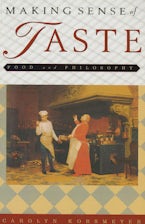A book about how the divergent histories of taste and Taste have left us with an impoverished understanding of the former—and thus a deep skepticism about the aesthetic worth of food. Carolyn Korsmeyer suggests that her project will illuminate readers' understanding of food—and observes that it might well illuminate our understanding of art as well. She succeeds on both counts.
~Hypatia
Anyone who critiques philosophy's 'venerable preoccupation with the 'mind' over the 'body' and 'matters of universal concern over particular experiences,' should read this book for the approach Korsmeyer uses to make her argument. Personally, I would add that anyone who thinks, who thinks about eating or drinking, who who even eats or drinks, should read it, too.
~Leonardo
In this thoroughly researched, well-organized, tightly argued, clearly-written, and stylistic book, Carolyn Korsmeyer has presented enough food for thought to keep all but the most jaded aestheticians engaged for many happy hours.
~Journal of Aesthetics and Art Criticism
It is to Korsmeyer's credit... that she has presented so strong a version of a philosophy of interpretation and shown how well it can be applied to food. As she insightfully establishes, philosophical tradition has not been able to find a place for gustatory taste within its framework, and it is a virtue of Korsmeyer's eloquent little study that she establishes a strong possibility for a cognitively rich philosophy of food.
~Gastronomica
Of the five senses, two—sight and hearing—were higher and lent themselves to aesthetic perception, while the remaining three—touch, taste and smell—were lower and non-aesthetic senses. Korsmeyer, in this sensitive and judicious book, explores and exposes the errors misinforming this conventional ranking.... This is an illuminating book.
~British Journal of Aesthetics

